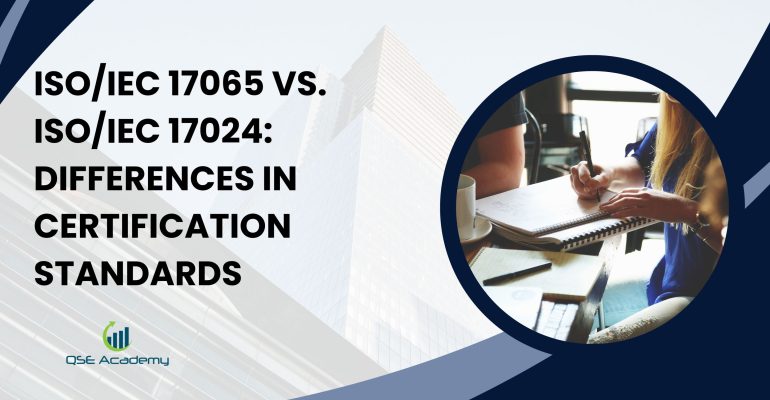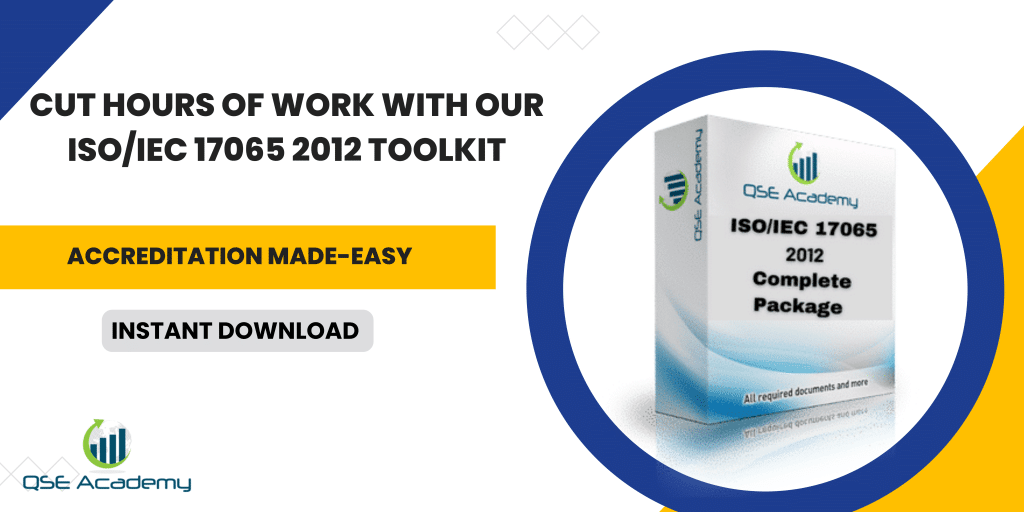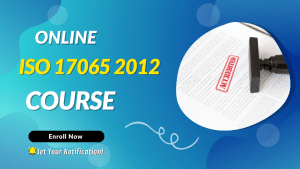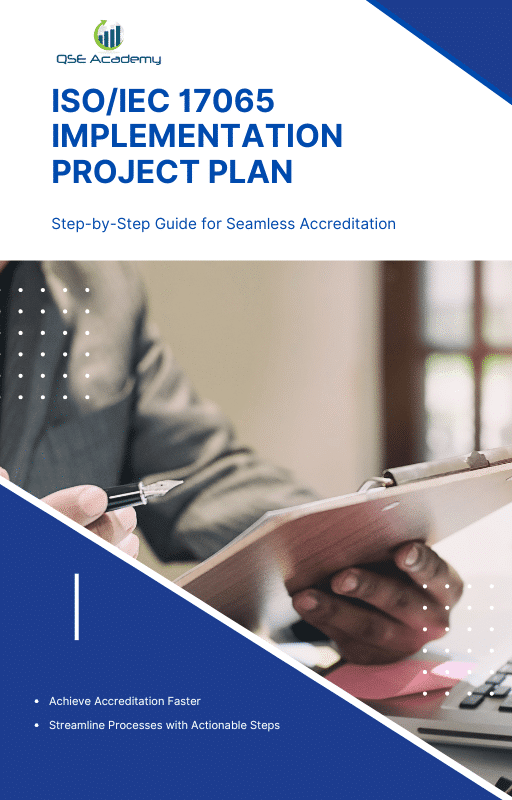ISO/IEC 17065 vs. ISO/IEC 17024: Differences in Certification Standards
Last Updated on December 23, 2025 by Hafsa J.
ISO/IEC 17065 vs. ISO/IEC 17024: Differences in Certification Standards
If you’re in the world of certifications, you’ve probably come across ISO/IEC 17065 and ISO/IEC 17024. At first glance, they might seem similar—they both set international standards for how certifications should be managed. But when you dig deeper, you’ll find that these two standards serve entirely different purposes.
So, what exactly are the ISO 17065 vs ISO 17024 differences, and why do they matter? Simply put:
- ISO 17065 is all about certifying products, services, and processes. It ensures that things like organic food labels, energy efficiency certifications, or product safety approvals are handled fairly and consistently by certification bodies.
- ISO 17024, on the other hand, is focused on people. It sets the requirements for certifying individuals in specific professions—think of it as the standard behind certified project managers, quality auditors, or cybersecurity professionals.
Understanding the ISO 17065 vs ISO 17024 differences is crucial if your organization is seeking accreditation. Choosing the wrong standard could lead to unnecessary complications, regulatory challenges, or even rejection by accreditation bodies.
In this article, we’ll break down everything you need to know about these two certification standards—what they cover, how they differ, and how to determine which one is right for your organization. By the end, you’ll have a clear understanding of the ISO 17065 vs ISO 17024 differences and how they impact certification processes worldwide. Let’s dive in!
What Are ISO 17065 and ISO 17024?
Before we dive into the key ISO 17065 vs ISO 17024 differences, let’s take a step back and understand what each of these certification standards actually covers. While both ensure that certifications are issued fairly, consistently, and transparently, they apply to completely different areas.
Understanding ISO/IEC 17065 – Certification of Products, Processes, and Services
ISO 17065 is the go-to standard for certifying things—whether it’s a physical product, a business process, or a specific service. It provides guidelines for certification bodies to evaluate whether a product, service, or process meets industry or regulatory standards.
Where is ISO 17065 used?
This standard is commonly applied in industries where certifications provide assurance to consumers and businesses, such as:
Food and Agriculture – Organic certifications, fair trade labels, and food safety approvals.
Environmental Standards – Energy efficiency certifications, eco-labeling, and sustainable product certifications.
Manufacturing and Product Safety – CE marking for electronic goods, fire safety certifications, and medical device approvals.
Service Certifications – Certifications for customer service excellence, security systems, and logistics services.
ISO 17065 ensures that the certification process remains unbiased—meaning the organization conducting the certification must be independent and free from conflicts of interest.
So, if your business deals with certifying products, processes, or services, ISO 17065 is likely the standard you need. But if you’re certifying people, that’s where ISO 17024 comes in.
Understanding ISO/IEC 17024 – Certification of Individuals
Unlike ISO 17065, which is all about certifying things, ISO 17024 is focused on certifying people and their competencies. It provides a framework for organizations that evaluate and certify professionals in various fields.
Where is ISO 17024 used?
This standard is commonly applied in industries where people’s skills and qualifications need independent validation, such as:
Professional Certifications – Project Management Professional (PMP), Certified Public Accountant (CPA), and Six Sigma certifications.
Technical & Engineering Professions – Certified Welders, Licensed Engineers, and HVAC specialists.
Healthcare & Safety – Certified Medical Coders, Occupational Safety Professionals, and First Aid Trainers.
IT & Cybersecurity – Certified Ethical Hackers (CEH), Certified Information Security Managers (CISM), and Cloud Security Certifications.
ISO 17024 ensures that certification bodies use standardized exams, competency assessments, and renewal processes to maintain the credibility of professional certifications.
ISO 17065 vs ISO 17024 Differences – The Core Distinction
If we had to sum up the ISO 17065 vs ISO 17024 differences in one sentence, it would be this:
ISO 17065 certifies products, services, and processes, while ISO 17024 certifies people.
This simple distinction makes a huge difference in how these two standards are applied. If you’re running a certification body, it’s important to know which standard fits your specific certification activities.
In the next section, we’ll take a closer look at the key differences between ISO 17065 and ISO 17024, breaking down scope, compliance, and industry applications to help you make the right choice. Stay tuned!
ISO 17065 vs ISO 17024 Differences – Key Distinctions
Now that we understand what ISO 17065 and ISO 17024 are, let’s dive deeper into their key differences. While both standards focus on ensuring fair and consistent certification, they apply to different areas and follow distinct processes.
So, what makes these two standards unique? Let’s break down the ISO 17065 vs ISO 17024 differences by looking at their scope, compliance requirements, and industry applications.
Scope of Certification – What’s Being Certified?
The most fundamental difference between ISO 17065 and ISO 17024 comes down to what they certify.
- ISO 17065 certifies things – products, services, and processes. Certification bodies assess whether a product meets safety regulations, a service adheres to quality standards, or a process follows industry best practices.
- ISO 17024 certifies people – it ensures that individuals have the required knowledge, skills, and competencies to perform specific professional roles. This standard is designed to make sure that certifications for engineers, auditors, and medical professionals are based on clear, standardized evaluations.
The key takeaway? If you’re certifying a product, process, or service, ISO 17065 applies. If you’re certifying an individual’s qualifications or competencies, then ISO 17024 is the right standard.
Accreditation Requirements and Compliance Criteria
While both standards focus on maintaining credibility and impartiality, the way they evaluate and approve certification bodies is quite different.
ISO 17065 Compliance Requirements:
Certification bodies must follow strict evaluation methods to verify products, services, or processes.
The certification process must be transparent, documented, and repeatable to ensure fairness.
Certification bodies cannot have financial or personal interests in the products or services they certify—impartiality is crucial.
ISO 17024 Compliance Requirements:
Certification bodies must establish clear criteria for evaluating individual competencies.
Exams, skill assessments, and interviews must be fair, standardized, and evidence-based.
Certification bodies need a renewal process to ensure that certified individuals maintain their skills over time.
Bottom line? ISO 17065 focuses on ensuring that certified products and services meet strict quality and safety standards, while ISO 17024 ensures that certified professionals are knowledgeable and competent in their respective fields.
Industries and Applications – Where Are These Standards Used?
Another major ISO 17065 vs ISO 17024 difference is where they are applied. Different industries rely on each standard to maintain credibility and compliance.
Industries That Use ISO 17065:
Food & Agriculture – Organic certification, food safety labeling, and fair trade approvals.
Manufacturing & Product Safety – CE marking, electrical safety certifications, and sustainable product approvals.
Environmental & Energy Certifications – Energy efficiency labels, eco-friendly product standards, and recycling certifications.
Service Certifications – Quality assurance certifications for customer service, security, and logistics.
Industries That Use ISO 17024:
Professional Certification Programs – Project management (PMP), financial certifications (CPA), and auditing credentials.
Healthcare & Medical Fields – Certifications for nurses, medical coders, and first aid trainers.
Cybersecurity & IT – Ethical hacking (CEH), cloud security (CCSP), and information security (CISM) certifications.
Engineering & Technical Professions – Structural engineers, HVAC specialists, and certified welders.
The key takeaway? If an industry requires competency-based certification for professionals, ISO 17024 applies. If it focuses on product safety, quality assurance, or process compliance, ISO 17065 is the standard to follow.
Final Thoughts on ISO 17065 vs ISO 17024 Differences
By now, you should have a clear understanding of the ISO 17065 vs ISO 17024 differences and why they matter.
ISO 17065 is for certifying products, services, and processes. It ensures that consumers and businesses can trust certification labels for food, electronics, environmental standards, and more.
ISO 17024 is for certifying people and their competencies. It guarantees that certified professionals are properly trained, tested, and qualified in their respective fields.
Both standards ensure impartiality, credibility, and transparency, but they apply to completely different certification areas.
Choosing the right standard depends on your organization’s certification needs. In the next section, we’ll explore how to decide between ISO 17065 and ISO 17024 and whether some organizations might need both. Stay with us!
How to Choose Between ISO 17065 and ISO 17024
Now that we’ve explored the ISO 17065 vs ISO 17024 differences, the big question is: Which one should you choose?
If your organization is considering certification, it’s essential to select the right standard to avoid unnecessary complications. Choosing the wrong framework could lead to regulatory issues, inefficiencies, or misaligned certification processes.
Let’s break it down and make it easy to decide which standard fits your needs.
Determining the Right Certification Standard for Your Organization
If you’re wondering whether ISO 17065 or ISO 17024 applies to your business, start by asking yourself this simple question:
Are you certifying a product, service, or process, OR are you certifying an individual’s competence?
Here’s a quick comparison to help guide your decision:
| Question | ISO 17065 | ISO 17024 |
|---|---|---|
| Are you certifying a product, service, or process? | ✅ Yes | ❌ No |
| Are you certifying an individual’s skills or competencies? | ❌ No | ✅ Yes |
| Does your certification involve testing physical items for compliance? | ✅ Yes | ❌ No |
| Does your certification require exams, training, or competency assessments? | ❌ No | ✅ Yes |
| Does your industry require product safety, environmental labeling, or service quality certifications? | ✅ Yes | ❌ No |
| Does your certification need renewal based on continuing education or re-examinations? | ❌ No | ✅ Yes |
Bottom line:
- If you’re certifying products, services, or processes, go with ISO 17065.
- If you’re certifying people’s skills and qualifications, go with ISO 17024.
Can an Organization Need Both ISO 17065 and ISO 17024?
In some cases, organizations may need to comply with both standards. This usually happens when an organization operates in multiple areas of certification, covering both products/services AND individual professionals.
Example Scenarios Where Both ISO 17065 and ISO 17024 Apply:
- A medical certification body might need ISO 17065 for approving medical devices AND ISO 17024 for certifying healthcare professionals.
- A food safety organization could require ISO 17065 for verifying organic food production AND ISO 17024 for certifying food safety auditors.
- A cybersecurity certification authority might issue ISO 17065-based certifications for secure software products while also using ISO 17024 for certifying ethical hackers or cybersecurity professionals.
In these cases, organizations should have separate accreditation processes for each standard to ensure they meet both product/service requirements (ISO 17065) and individual competency requirements (ISO 17024).
Final Thoughts on Choosing Between ISO 17065 and ISO 17024
Understanding the ISO 17065 vs ISO 17024 differences is essential for making the right certification decision.
- Choose ISO 17065 if your organization certifies products, services, or processes and needs to ensure compliance with industry regulations and consumer trust standards.
- Choose ISO 17024 if your organization certifies people and needs to verify their skills, competencies, and qualifications through structured exams and training assessments.
- Consider both standards if your organization operates in multiple certification areas, covering both product/service validation and professional competency assessments.
By selecting the right standard, your certification body can stay compliant, maintain credibility, and provide meaningful certifications that are recognized worldwide.
In the next section, we’ll explore how to implement ISO 17065 or ISO 17024 certification successfully—so stay with us!
Ensuring Compliance with ISO 17065 and ISO 17024
Once you’ve determined which certification standard applies to your organization, the next step is achieving and maintaining compliance. Whether you’re following ISO 17065 for certifying products, services, and processes or ISO 17024 for certifying individuals, you’ll need a structured approach to meet regulatory requirements.
Let’s walk through the key steps to ensure compliance with ISO 17065 and ISO 17024, along with common challenges and how to overcome them.
The Certification Process for Each Standard
While ISO 17065 and ISO 17024 are different in their focus, both standards require certification bodies to demonstrate impartiality, consistency, and reliability. Here’s a step-by-step look at how compliance works for each standard.
Steps to Achieve ISO 17065 Compliance (For Certifying Products, Services, and Processes)
Establish Certification Criteria – Define the specific requirements for the product, service, or process you’re certifying. These might be based on industry regulations, safety laws, or environmental standards.
Develop an Evaluation Methodology – Ensure that your certification body has consistent testing, inspection, and review processes to determine if a product or service meets the criteria.
Ensure Impartiality – Certification bodies must be independent and free from conflicts of interest to maintain trust.
Maintain Transparent Records – Keep detailed records of certification decisions, testing results, and quality assessments to ensure accountability.
Undergo Regular Accreditation Audits – Certification bodies must be audited by an accreditation organization (such as IAF or a national accreditation body) to verify ongoing compliance.
Steps to Achieve ISO 17024 Compliance (For Certifying Individuals)
Define Competency Standards – Identify the knowledge, skills, and abilities required for a professional certification.
Develop Assessment Methods – Exams, interviews, and skill-based tests should be structured to fairly evaluate candidates.
Implement Certification & Renewal Policies – Unlike ISO 17065, ISO 17024 certifications often require renewal, meaning certified professionals may need continuing education, recertification exams, or periodic reassessments.
Ensure Exam Security & Fairness – Certification bodies must have processes to prevent cheating, ensure fairness, and standardize exam difficulty.
Stay Updated with Industry Requirements – Professional competency requirements change over time, so ongoing review of certification programs is essential.
Key takeaway? ISO 17065 focuses on product/service evaluation and compliance with industry standards, while ISO 17024 ensures that certified professionals meet clear competency requirements and undergo regular renewal assessments.
Common Compliance Challenges and How to Overcome Them
Even with the best preparation, certification bodies often face challenges in implementing ISO 17065 or ISO 17024 compliance. Here are some of the most common hurdles—and how to handle them.
Challenge #1: Keeping Up with Evolving Regulations
The Problem: Regulatory requirements frequently change, affecting both product/service certifications (ISO 17065) and professional competency standards (ISO 17024).
Solution:
- Subscribe to updates from ISO, industry regulators, and accreditation bodies.
- Conduct annual compliance reviews to align your certification process with the latest regulations.
- Invest in compliance tracking software to automate updates.
Challenge #2: Ensuring Impartiality in Certification Decisions
The Problem: Certification bodies must remain independent and unbiased, but conflicts of interest can arise—especially in industries where product manufacturers or training organizations are closely involved in the certification process.
Solution:
- Establish strict conflict-of-interest policies to prevent financial or personal influence over certification decisions.
- Train auditors and assessors on ethics and impartiality best practices.
- Use third-party reviews to validate certification results.
Challenge #3: Managing Certification Renewals and Continuous Compliance
The Problem: Unlike ISO 17065, which typically certifies products or processes once, ISO 17024 requires recertification for individuals to ensure continued competency.
Solution:
- Set up automated renewal reminders for certified professionals.
- Require ongoing training or periodic exams to keep certifications active.
- Work with industry partners to align certification updates with evolving job requirements.
Challenge #4: Handling Large-Scale Certification Operations Efficiently
The Problem: Certification bodies handling high volumes of applications, audits, and renewals may struggle with administrative efficiency.
Solution:
- Implement digital certification platforms for online applications, document storage, and exam administration.
- Use AI-driven compliance tools to detect inconsistencies and improve accuracy in evaluations.
- Automate report generation and tracking to reduce manual workload.
Final Thoughts on Ensuring Compliance with ISO 17065 and ISO 17024
Achieving ISO 17065 or ISO 17024 certification is not just about passing an audit once—it requires ongoing commitment to quality, transparency, and regulatory compliance.
For ISO 17065, focus on consistent product/service evaluations, impartiality, and industry regulation updates.
For ISO 17024, prioritize competency-based assessments, exam security, and continuous professional development.
Both standards require strong documentation, regular audits, and an impartial certification process to maintain credibility.
By addressing compliance challenges head-on and implementing best practices, certification bodies can ensure long-term success and industry recognition.
In the next section, we’ll explore future trends shaping the ISO 17065 vs ISO 17024 certification landscape, including digital transformation, global recognition, and evolving industry demands. Stay tuned!
Future Trends in ISO 17065 vs ISO 17024 Certification
As industries continue to evolve, so do the certification standards that ensure credibility, quality, and compliance. Both ISO 17065 and ISO 17024 are adapting to meet new demands in technology, globalization, and regulatory expectations. So, what’s next for these standards?
In this section, we’ll explore the emerging trends that are shaping the future of ISO 17065 vs ISO 17024 differences and how certification bodies can stay ahead of the curve.
1. Digital Transformation in Certification Processes
The world is going digital, and certification bodies are no exception. Technology is revolutionizing the way certifications are managed, assessed, and verified—affecting both ISO 17065 and ISO 17024 compliance.
For ISO 17065 (Product & Service Certification):
AI-driven compliance checks – Artificial Intelligence (AI) is helping certification bodies automate audits and detect non-conformities faster.
Blockchain for certification verification – Some organizations are adopting blockchain technology to create tamper-proof records of product certifications.
Remote product testing and evaluation – More certification bodies are using virtual inspections and digital tracking to assess compliance in real time.
For ISO 17024 (Personnel Certification):
Online proctored exams – Remote certification exams with AI-driven monitoring are making assessments more accessible and secure.
Digital badges and verifiable e-certifications – Professionals can now share verified digital credentials that employers can instantly validate.
Skill tracking and AI-based training recommendations – Smart certification platforms suggest personalized training programs based on a candidate’s strengths and weaknesses.
Pro Tip: Organizations that invest in digital certification platforms and automated compliance tools will be better positioned for the future.
2. Increasing Global Recognition & Cross-Border Compliance
One of the biggest shifts happening in ISO 17065 vs ISO 17024 certification is the growing push for international harmonization.
For ISO 17065:
- More countries are aligning their national product certification regulations with ISO 17065, reducing trade barriers.
- The Mutual Recognition Agreement (MRA) system is expanding, allowing product certifications to be accepted across multiple countries.
For ISO 17024:
- Professional certification bodies are working toward global mobility agreements to allow certified professionals to work across borders without needing redundant credentials.
- Some industries (such as engineering, IT, and healthcare) are establishing global competency frameworks based on ISO 17024 certification principles.
Pro Tip: Certification bodies that collaborate with international accreditation networks will have a competitive advantage in the global market.
3. The Rise of Sustainability & Ethical Compliance
Sustainability and ethical responsibility are becoming top priorities in both product and personnel certifications.
For ISO 17065:
Companies seeking certification now need to meet stricter environmental regulations, especially in energy efficiency, eco-labeling, and carbon footprint assessments.
The demand for sustainable product certifications (such as organic, fair trade, and recyclable materials) is growing.
For ISO 17024:
Professional certifications are now considering ethics and sustainability training as a core requirement for many industries.
Organizations are ensuring that certified professionals uphold ethical standards in decision-making, data security, and workplace responsibility.
Pro Tip: Certification bodies that incorporate sustainability and ethics into their evaluation processes will be better aligned with future regulatory expectations.
4. Adaptive Learning & Continuous Certification Updates
As industries rapidly change, professionals need ongoing learning and recertification to stay relevant. This is especially important for ISO 17024-certified professionals, where knowledge can quickly become outdated.
For ISO 17024:
More certifications are moving toward “micro-credentials” and stackable learning to help professionals continuously upgrade their skills.
AI-driven competency tracking is allowing organizations to identify skill gaps and recommend personalized training.
Certification renewal cycles are shortening, requiring professionals to undergo continuous assessments and skill updates.
For ISO 17065:
Certification bodies are adopting real-time monitoring to ensure product and service certifications remain valid between audit cycles.
Some industries are moving toward dynamic certification models, where compliance is evaluated continuously rather than just at renewal periods.
Pro Tip: Certification bodies that offer flexible renewal programs and AI-driven learning recommendations will attract more professionals and organizations seeking long-term compliance.
Final Thoughts on the Future of ISO 17065 vs ISO 17024 Certification
The future of ISO 17065 and ISO 17024 certification is being shaped by technology, globalization, sustainability, and adaptive learning. Here’s what certification bodies should focus on:
Embracing digital transformation – Automation, blockchain, and AI will make certification faster, more secure, and more efficient.
Expanding global recognition – International trade and professional mobility will require more harmonized certification systems.
Strengthening sustainability and ethics – Certification bodies will need to integrate environmental and ethical standards into their frameworks.
Focusing on continuous learning – Professionals and industries will expect more dynamic certification renewal programs.
Organizations that adapt to these trends will enhance their credibility, expand market opportunities, and maintain compliance in a rapidly evolving world.
In the final section, we’ll wrap up with a summary of the ISO 17065 vs ISO 17024 differences and provide guidance on how organizations can make the best certification decisions moving forward. Stay tuned!
Conclusion – Making Sense of ISO 17065 vs ISO 17024 Differences
By now, you have a clear understanding of the ISO 17065 vs ISO 17024 differences and how these two certification standards apply to different aspects of compliance. While both ensure credibility, impartiality, and structured certification processes, they serve distinct purposes in the world of accreditation.
To recap:
- ISO 17065 is for certifying products, services, and processes. It ensures that certification bodies follow strict guidelines to verify that goods and services meet industry and regulatory standards.
- ISO 17024 is for certifying individuals. It focuses on competency-based assessments to verify that professionals have the skills and knowledge required for specific jobs and industries.
- Both standards ensure transparency, fairness, and trust, but they apply to completely different certification needs.
So, how do you decide which one is right for your organization?
- If your goal is to certify a product, a service, or a business process, ISO 17065 is the standard to follow.
- If your goal is to certify individuals based on exams, assessments, or qualifications, ISO 17024 is the better fit.
- If your organization operates in both areas (for example, certifying medical devices under ISO 17065 while also certifying medical professionals under ISO 17024), you may need to comply with both standards.
Final Thoughts on ISO 17065 vs ISO 17024 Differences
The world of certification is evolving, and understanding ISO 17065 vs ISO 17024 differences is key to choosing the right accreditation path. As industries adopt digital transformation, global compliance, sustainability initiatives, and adaptive learning models, certification bodies must stay ahead of trends to remain relevant.
If your organization is considering certification, take the time to:
Evaluate your certification scope – Are you certifying products, services, or people?
Research regulatory requirements – Some industries may require compliance with one or both standards.
Stay ahead of industry trends – As certification processes evolve, embracing technology and continuous learning will be essential.
By making informed decisions, organizations can ensure their certifications hold value, maintain credibility, and meet international compliance expectations.
Ready to take the next step? Whether you’re aiming for ISO 17065, ISO 17024, or both, ensuring proper implementation and compliance will set your certification body up for long-term success.
I hold a Master’s degree in Quality Management, and I’ve built my career specializing in the ISO/IEC 17000 series standards, including ISO/IEC 17025, ISO 15189, ISO/IEC 17020, and ISO/IEC 17065. My background includes hands-on experience in accreditation preparation, documentation development, and internal auditing for laboratories and certification bodies. I’ve worked closely with teams in testing, calibration, inspection, and medical laboratories, helping them achieve and maintain compliance with international accreditation requirements. I’ve also received professional training in internal audits for ISO/IEC 17025 and ISO 15189, with practical involvement in managing nonconformities, improving quality systems, and aligning operations with standard requirements. At QSE Academy, I contribute technical content that turns complex accreditation standards into practical, step-by-step guidance for labs and assessors around the world. I’m passionate about supporting quality-driven organizations and making the path to accreditation clear, structured, and achievable.










